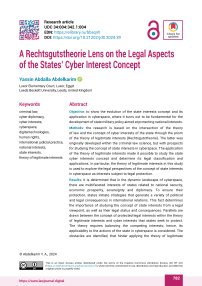A Rechtsgutstheorie Lens on the Legal Aspects of the States’ Cyber Interest Concept
Автор: Abdelkarim Y. A.
Журнал: Journal of Digital Technologies and Law @lawjournal-digital
Статья в выпуске: 2 (4), 2024 года.
Бесплатный доступ
Objective: to show the evolution of the state interests concept and its application in cyberspace, where it turns out to be fundamental for the development of state military policy aimed at protecting national interests. Methods: the research is based on the intersection of the theory of law and the concept of cyber interests of the state through the prism of the theory of legitimate interests (Rechtsgutstheorie). The latter was originally developed within the criminal law science, but with prospects for studying the concept of state interests in cyberspace. The application of the theory of legitimate interests made it possible to study the state cyber interests concept and determine its legal classification and applications. In particular, the theory of legitimate interests in this study is used to explore the legal perspectives of the concept of state interests in cyberspace as interests subject to legal protection. Results: it is determined that in the dynamic landscape of cyberspace, there are multifaceted interests of states related to national security, economic prosperity, sovereignty and diplomacy. To ensure their protection, states initiate strategies that generate a variety of political and legal consequences in international relations. This fact determines the importance of studying the concept of state interests from a legal viewpoint, as well as their legal status and consequences. Parallels are drawn between the concept of protected legal interests within the theory of legitimate interests and cyber interests that states seek to protect. The theory requires balancing the competing interests; hence, its applicability to the actions of the state in cyberspace is considered. The obstacles are identified, that hinder applying the theory of legitimate interests to cyberspace, including difficulties of attribution, damage thresholds and the need for global consensus. The author shows the evolution of the concept of state interests, which determines the possibility of its application in cyberspace, where it serves the purposes of developing state policy aimed at protecting national interests. Scientific novelty: it is expressed in the reflection of the theory of legitimate interests to the formation of the legal concept of cyber interests of the state, which serves as a sufficient justification for the protection of specific cyber interests. Practical significance: the main conclusions outlined in the article can be used to identify cyberspace interests subject to legal protection (such as confidentiality, data integrity, sovereignty, and economic stability). They may also improve legal mechanisms for protecting national interests in cyberspace, ensure uniformity of relevant international judicial practice, and improve the efficiency and quality of state policy management in cyberspace in order to ensure security and peaceful coexistence.
Criminal law, cyber diplomacy, cyber interests, cyberspace, digital technologies, human rights, international judicial practice, national interests, state interests, theory of legitimate interests
Короткий адрес: https://sciup.org/14131252
IDR: 14131252 | УДК: 34:004:342.1:004 | DOI: 10.21202/jdtl.2024.39


